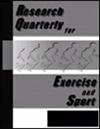社会支持类型对癌症成人团体锻炼计划中的体育活动和生活质量的预测。
IF 1.6
4区 教育学
Q3 HOSPITALITY, LEISURE, SPORT & TOURISM
引用次数: 0
摘要
社会支持(SS)和体育活动(PA)可以提高癌症患者的生活质量(QoL),这意味着集体体育活动计划对于康复非常重要。然而,社会支持有很多种类型,很少有研究比较哪些社会支持概念与体力活动和生活质量的关系更密切。这项探索性横断面研究考察了在肿瘤团体锻炼班中由其他人提供的几种类型的SS与成年癌症患者的PA和QoL之间的关系。研究假设所有类型的SS都与PA和QoL呈正相关。参与者(N = 72)填写了一份调查问卷,评估了 11 个 SS 预测因子、5 个 QoL 结果和 1 个自我报告的 PA 结果,并佩戴 Fitbit 评估了 1 周的步数。我们使用多元回归法对假设进行了检验。价值支持保证预测了自我报告的中度到剧烈运动(R2 = .07, p = .03)。关系障碍对一般幸福感(R2 = .07,p = .03)和社会幸福感(R2 = .10,p = .01)具有负向预测作用。社会网络可预测身体幸福感(R2 = .07, F(1, 66) = 4.93, p = .03)。其他结果没有明显的 SS 预测因素。肿瘤团体运动项目应培训指导员,通过认可或促进其他参与者认可参与者的运动能力和技能来促进价值保证,通过创造长期联系的机会来鼓励发展社会关系,并通过促进归属感和包容性来最大限度地减少相关性阻碍。未来的研究应在更大的样本和不同的成年癌症患者群体中比较不同类型的 SS。本文章由计算机程序翻译,如有差异,请以英文原文为准。
Types of Social Support Predicting Physical Activity and Quality of Life in Group Exercise Programs for Adults Living with Cancer.
Social support (SS) and physical activity (PA) can improve quality of life (QoL) in cancer, meaning group PA programs are important for rehabilitation. However, there are many types of SS, and few studies have compared which SS concepts are more strongly associated with PA and QoL. This exploratory cross-sectional study examined the association between several types of SS provided by other people in group exercise oncology classes and PA and QoL among adults living with cancer. It was hypothesized all types of SS would be positively associated with PA and QoL. Participants (N = 72) completed a questionnaire assessing 11 SS predictors, five QoL outcomes, and one self-reported PA outcome, and wore a Fitbit to assess step count for 1 week. Hypotheses were tested using multiple regression. Reassurance of worth support predicted self-reported moderate-to-vigorous PA (R2 = .07, p = .03). Relatedness thwarting negatively predicted general (R2 = .07, p = .03) and social well-being (R2 = .10, p = .01). Social network predicted physical well-being (R2 = .07, F(1, 66) = 4.93, p = .03). There were no significant SS predictors of the other outcomes. Group exercise oncology programs should train instructors to promote reassurance of worth by recognizing or facilitating other participants to recognize participants' PA competence and skills, encourage developing social relationships by creating opportunities to connect over time, and minimize relatedness thwarting by promoting belonging and inclusion. Future research should compare different types of SS in larger samples and diverse populations of adults living with cancer.
求助全文
通过发布文献求助,成功后即可免费获取论文全文。
去求助
来源期刊
CiteScore
4.30
自引率
0.00%
发文量
125
审稿时长
6-12 weeks
期刊介绍:
Research Quarterly for Exercise and Sport publishes research in the art and science of human movement that contributes significantly to the knowledge base of the field as new information, reviews, substantiation or contradiction of previous findings, development of theory, or as application of new or improved techniques. The goals of RQES are to provide a scholarly outlet for knowledge that: (a) contributes to the study of human movement, particularly its cross-disciplinary and interdisciplinary nature; (b) impacts theory and practice regarding human movement; (c) stimulates research about human movement; and (d) provides theoretical reviews and tutorials related to the study of human movement. The editorial board, associate editors, and external reviewers assist the editor-in-chief. Qualified reviewers in the appropriate subdisciplines review manuscripts deemed suitable. Authors are usually advised of the decision on their papers within 75–90 days.

 求助内容:
求助内容: 应助结果提醒方式:
应助结果提醒方式:


